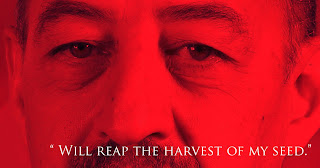Mind-blowingly beautiful, seductive and terrifying.
He is Kurt Castillo’s Dionysos in MADC’S production of The Bacchae, currently showing at the MITP in Valletta.
I’d been hearing good reports about this production all through last weekend. But it took me a while to actually secure my ticket, mainly because I have to admit that Greek tragedies aren't my typical cuppa.
Yes, ladies and gents, I’m part of the great unwashed who prefer their culture quota to include a liberal side serving of either caustic humor or sex’n'guts. Or both, like that unforgettable production of Fat Men in Skirts all those years ago.
He is Kurt Castillo’s Dionysos in MADC’S production of The Bacchae, currently showing at the MITP in Valletta.
I’d been hearing good reports about this production all through last weekend. But it took me a while to actually secure my ticket, mainly because I have to admit that Greek tragedies aren't my typical cuppa.
Yes, ladies and gents, I’m part of the great unwashed who prefer their culture quota to include a liberal side serving of either caustic humor or sex’n'guts. Or both, like that unforgettable production of Fat Men in Skirts all those years ago.
I could have sworn that long Greek monologues based on the vengeance of the gods didn’t fall in either category. It’s Greek mythology for heaven’s sake. It's what we studied at school, not what we look for in entertainment on a Friday night.
Then I saw Darrin Zammit Lupi's mesmerising photographic chronicles on Monday, from which the images in the above video were compiled. Every image hinted at a dramatic, stylish and beautifully choreographed production. Hmm. I booked my ticket and went on to brush up on my Greek mythology. Wise choice, as it turned out. From the moment I stepped into the MITP I forgot all about my cravings for a good G&T and entered a world of Bacchic intrigue.
A smoke-filled theatre and the quasi-sinister Bakkhai, languishing on each corner of the stage, face entirely hidden, set the tone. Enter Dionysos; and from the moment he does, there is no forgetting him. From the serpentine sway of his hips to the semi-insolent way he lilts his own name, he courts the audience. Part Lady Gaga, part spoilt brat, part terrifying god, part androgynous seducer, Castillo makes the part – and the play – his.
The Bakkhai, those wanton women who satisfy Dionysos’s every whim, are the other focal point of the production. Fiery red and golden-voiced, every single performer brought a touch of something to the show; Maria Pia Meli’s and Marta Vella’s powerful voices, Laura Best’s semi demented denunciations, Veronica Stivala’s and Nicola Abela Garrett’s swift character changes, Coryse Borg’s pathetic monologue detailing Pentheus’s death…. It was easy for these Bakkhai to disappear within the group, yet they didn’t.
Phillip Leone Ganado was a convincing Pentheus, a tad overshadowed by Dionysos but such is the nature of the play. Manuel Cauchi’s (as Kadmos) and Paul Portelli’s (as Tereisias) monologues were inspired. As for Pia Zammit’s portrayal of Agave, at whose hand Pentheus meets his grisly end… Her mother’s lament towards the end of the play was the very definition of pathos. If Dionysos was the one to set the stage for mindless debauchery, she was the one to give the production its sudden and brutal return to reality.
The whole production wouldn’t have been half as remarkable without Alexander Vella Gregory’s original score, Sandra Mifsud’s choreography or director Toni Attard’s vision. Get your tickets for this production here. It runs this weekend and next.
Follow Ramona Depares' blog here.
















